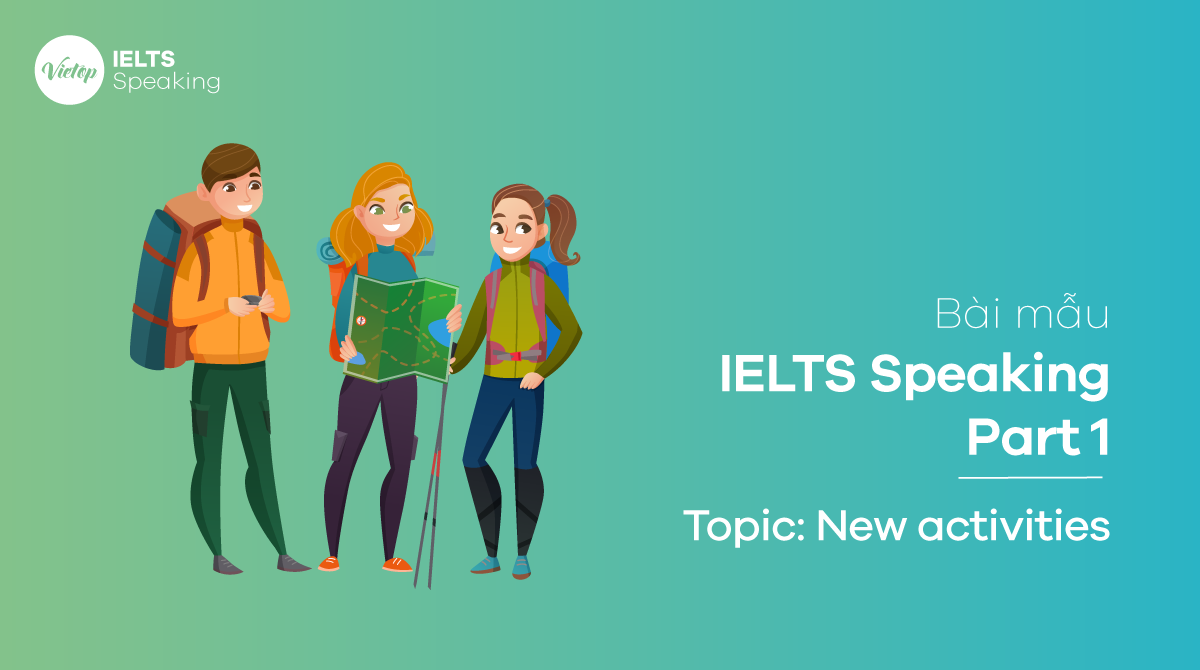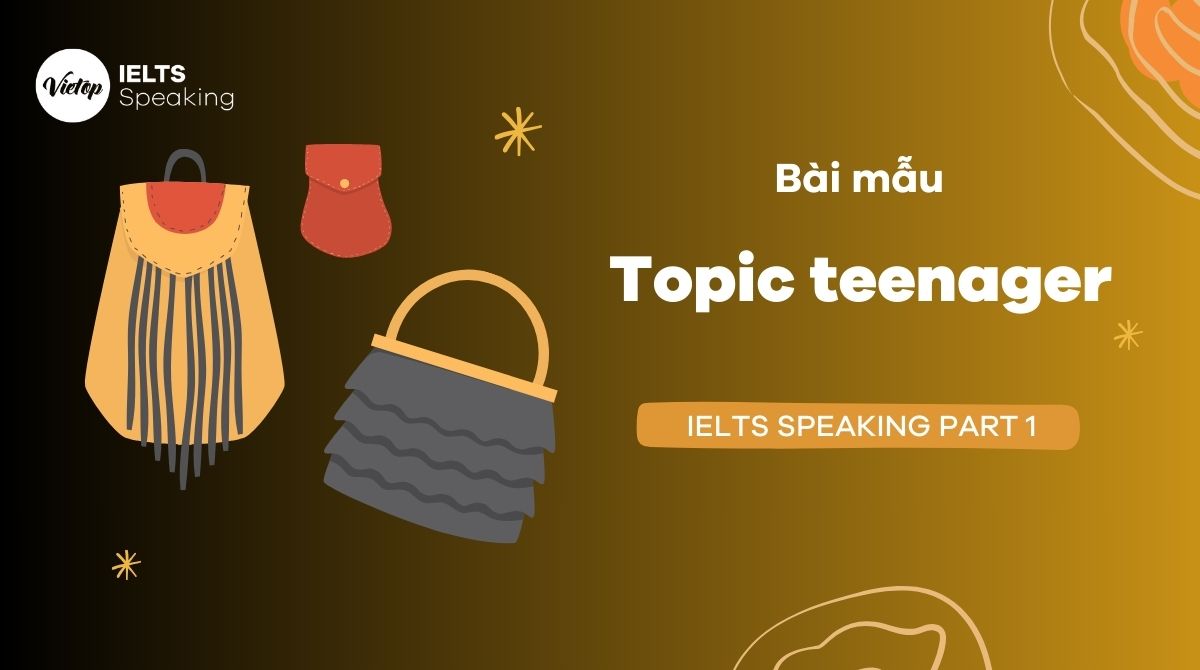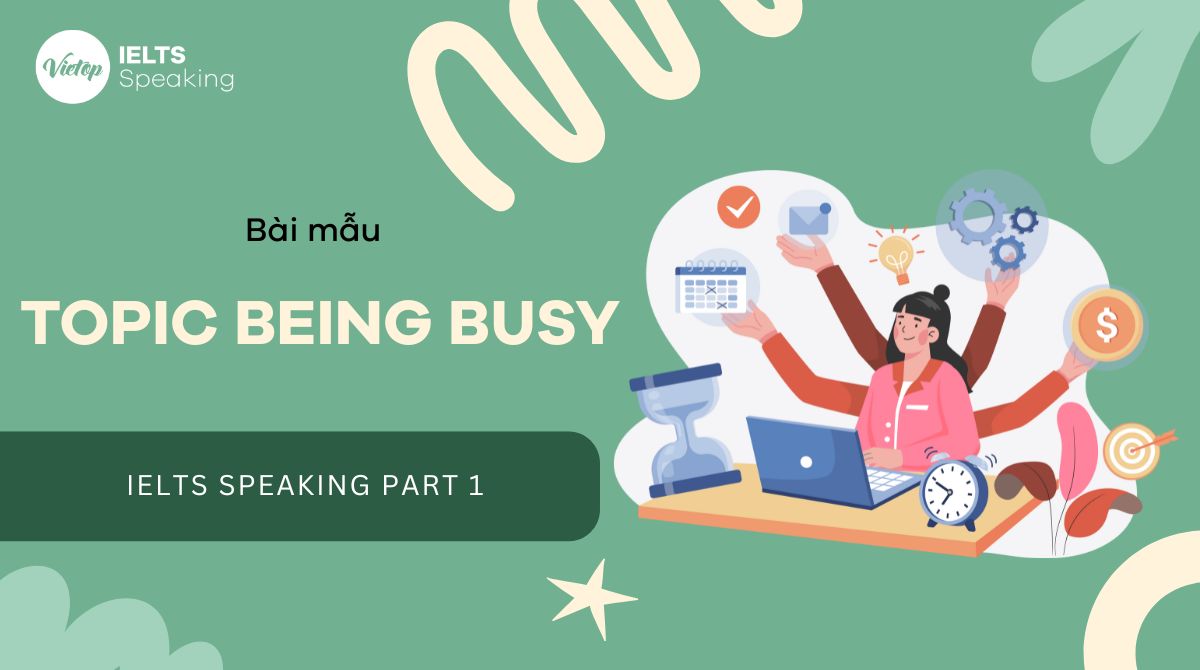Nếu bạn đang ôn luyện thi IELTS thì chắc không còn quá xa lạ với chủ đề New Activities, vậy trong phần chia sẻ này hãy cùng Vietop tham khảo bài mẫu topic New Activities – IELTS Speaking Part 1 để thêm nhiều ý tưởng “hay ho” cho phần nói của bạn nhé!
Bài mẫu topic New Activities – IELTS Speaking part 1

Mời mọi người nghe Audio topic New Activities tại đây nhé!
1. Do you like trying activities? Why?
I am quite enthusiastic about exploring new activities. Anything novel or unusual provides me with a break from my regular routine. I personally become tired with monotonous tasks and am constantly seeking variety. They inspire me to do something new that I greatly enjoy.
- Monotonous (adj): một màu, nhàm chán
2. Did you enjoy trying new activities when you were younger?
Yes. I did. In the past, I spent a lot of time with my friends and engaged in fascinating activities. But since I began working, I haven’t had as much time as I formerly did to explore new things.
3. Is there a new activity you would really like to try?
Sure. I’ve recently considered learning how to surf. When I have some free time, I will have a friend who is exceptionally skilled at surfing instruct me on this new sport.
- Surf (v): lướt sóng
4. Is it good for people to try new things?
I believe experiencing something new broadens a person’s horizon and revitalizes their spirit. Trying new things can help people learn more about themselves and may even lead some of them to find hidden skills. It also helps people overcome their concerns and provides them with a fresh viewpoint, which fuels their imagination and boosts their self-assurance. Therefore, it is certainly beneficial for everyone.
- Broaden one’s horizon: mở rộng tầm mắt, kiến thức của ai đó
- Revitalize one’s spirit: vực lại tinh thần cho ai đó
- Self-assurance (n): sự tự tin
5. Why are some people afraid of trying new things?
Absolutely, embracing new experiences is beneficial as it broadens horizons and uplifts one’s spirit. Despite initial apprehension, venturing into uncharted territory is rewarding, expanding mental landscapes and evoking a sense of soaring achievement. Trying new things enables personal discovery and uncovers latent talents.
It liberates individuals from monotony, fostering personal growth and well-being. Moreover, it empowers individuals to conquer fears, fostering a fresh outlook that fuels creativity and bolsters confidence. Undoubtedly, it’s a positive pursuit for everyone.
- Embracing: ôm ấp
- Broadens horizon: mở rộng tầm nhìn
- Fostering: bồi dưỡng
6. Why are some people afraid of trying new things?
Certainly, individuals may exhibit a reluctance to step outside their comfort zone for several reasons. Primarily, they might fear the unfamiliarity of actions or situations beyond their usual routines. This fear of the unknown could stem from apprehensions about potential failure or feelings of insecurity.
Some individuals are averse to change as they fear the potential loss of what they already possess. Additionally, there are those who hesitate to try new things due to uncertainty about the outcomes and concerns about the unknown nature of the action itself.
- Reluctance: sự miễn cưỡng
- Apprehensions: sự e ngại
- Insecurity: sự bất an
7. What help do people need when they are trying new things?
Primarily, individuals undergoing change require psychological assistance to navigate their emotional spectrum, encompassing feelings of threat, anxiety, and relief. Practical advice and techniques to proficiently handle stress arising from change are essential. Building trust in one’s capabilities and acknowledging small achievements play a pivotal role.
Some individuals might require guidance to recognize the gains derived from embracing new experiences, as understanding the benefits becomes pivotal in conquering their fears. Additionally, expert guidance may be necessary to foster a sense of safety and alleviate concerns regarding potential physical or material harm during transitional phases.
- Emotional spectrum: quang phổ cảm xúc
- Encompassing feelings of threat: bao gồm cảm giác bị đe dọa
- Transitional phases: giai đoạn chuyển tiếp
8. What are some of the difficulties a person might have when they try something new?
Certainly, individuals embarking on new endeavors encounter various challenges. Among these hurdles, a primary concern is the fear of making mistakes that could potentially cause harm to themselves or others. Additionally, there’s the risk of losing interest in the new activity, leading to boredom and subsequent negative emotions, affecting their overall mood.
Another notable challenge is the potential loss of confidence stemming from an experience not meeting their expectations, which might temporarily discourage them from further exploration of new activities. These difficulties – fear of mistakes, loss of interest, and diminished confidence – often represent significant obstacles encountered when engaging in something unfamiliar for the first time.
- Endeavors encounter: nỗ lực gặp phải
- Potentially cause harm: Có khả năng gây hại
9. Do you think it’s better to have new experiences when you are young or when you are older?
Undoubtedly, the prime time for embracing new experiences and learning new skills is typically during youth. This is because older individuals often perceive they have amassed sufficient life experiences, and consequently, they may not actively pursue or engage in novel learning opportunities. Moreover, as individuals age, they may gradually lose enthusiasm for learning and consciously opt to cease their educational pursuits, often without recognizing this decision.
Physical changes associated with aging, such as reduced vision and hearing abilities, can also impede the older population’s learning capabilities, necessitating more time and effort to acquire and master new skills. Therefore, it’s evident that young age is generally regarded as the optimal phase for exploring new experiences and acquiring fresh skills.
- Pursuits: theo đuổi
- Impede: cản trở
Hy vọng qua bài mẫu Topic New Activities – IELTS Speaking Part 1, bạn đã có thêm nhiều từ vựng mới và ý tưởng thú vị để giúp bài thi của mình thêm phần sinh động. Để tham khảo nhiều bài mẫu hơn, bạn có thể ghé thăm IELTS Speaking – Vietop để luyện tập thường xuyên nhé!









